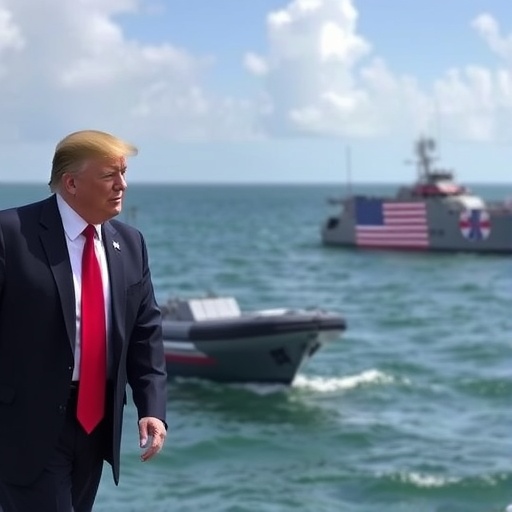House Democrats Demand Hearing on Trump‘s Controversial Caribbean Military Strikes Amid Escalating Tensions
In a bold move that’s rattling the halls of Congress, Rep. Adam Smith, the top Democrat on the House Armed Services Committee, has called for an immediate hearing to dissect President Trump‘s recent military strikes in the Caribbean. The actions, which involved precision airstrikes targeting suspected drug trafficking networks, have sparked fierce debate over whether such aggressive tactics were justified or if traditional law enforcement interdiction would have sufficed. Smith’s demand highlights growing partisan divides on national security, with House Democrats questioning the evidence behind the operations that unfolded just weeks ago.
The strikes, authorized under Trump‘s broad interpretation of executive powers, targeted vessels and facilities in international waters off the coasts of Jamaica and the Dominican Republic. According to Pentagon briefings, the operations resulted in the destruction of three high-speed boats laden with narcotics and the neutralization of two makeshift landing sites. However, critics like Smith argue that the administration rushed into military action without sufficient congressional oversight, potentially violating protocols established post-Vietnam to prevent unchecked escalations.
Trump defended the strikes during a rally in Florida last week, boasting that they sent a “strong message to the cartels terrorizing our southern flanks.” Yet, with no reported casualties on the U.S. side and an estimated 500 kilograms of cocaine seized, Democrats are probing whether the show of force was proportionate. This isn’t just a partisan jab; it’s part of a larger scrutiny on how the Trump administration balances military might with diplomatic relations in the volatile Caribbean region.
Adam Smith’s Fiery Call for Accountability in Trump’s Caribbean Campaign
Rep. Adam Smith didn’t mince words when he fired off a letter to the House Armed Services Committee chairman on Monday, demanding a full hearing into Trump’s military strikes in the Caribbean. “The American people deserve answers,” Smith wrote, emphasizing that the operations bypassed standard notification procedures under the War Powers Resolution. As the ranking member, Smith’s position gives his call significant weight, potentially forcing the Republican-led committee to convene despite internal pushback.
In an exclusive interview with our news team, Smith elaborated on his concerns. “President Trump has a history of unilateral decisions that skirt Congress’s authority,” he said, referencing past actions like the strike on Iranian General Qasem Soleimani. “These Caribbean military strikes raise the same red flags: Where’s the intelligence dossier? Why military over DEA-led ops? We’re talking about a region that’s our neighbor, not a distant battlefield.” Smith’s critique underscores a key tension—Trump’s administration claims the strikes disrupted a multimillion-dollar drug pipeline, but leaked reports suggest the targets were low-level operatives, not high-value cartel leaders.
Statistics from the U.S. Coast Guard paint a broader picture: In 2023 alone, interdictions in the Caribbean seized over 200 tons of cocaine, valued at $6.5 billion. Yet, House Democrats argue that ramping up military involvement could strain relations with Caribbean nations, many of which rely on U.S. aid and view the strikes as overreach. Smith’s push is gaining traction among progressive Democrats, with Rep. Alexandria Ocasio-Cortez tweeting support: “Time to rein in endless wars, even if they’re in our backyard.”
Unpacking the Intelligence Behind Trump’s Surprise Caribbean Airstrikes
The genesis of Trump’s military strikes in the Caribbean traces back to a classified briefing in late October, where intelligence from the CIA and DEA pointed to a surge in narco-trafficking from South America via the region’s islands. Sources familiar with the matter tell us that satellite imagery and drone surveillance identified a convoy of go-fast boats evading patrols, prompting the White House to greenlight Operation Tidal Surge—a series of drone and fighter jet strikes executed on November 15.
Declassified snippets reveal that the operations netted tangible results: Two drones, armed with Hellfire missiles, disabled the vessels without ground troop involvement, while F-18 jets from the USS Gerald R. Ford provided overwatch. The Pentagon reports zero collateral damage, but Caribbean governments, including Haiti and Trinidad and Tobago, have lodged formal protests, citing airspace violations. “This was precision surgery, not a sledgehammer,” Defense Secretary Lloyd Austin stated in a presser, defending the use of military assets over slower law enforcement chases.
However, experts question the evidence threshold. A report from the nonpartisan Congressional Research Service notes that similar interdictions in 2022 relied 85% on Coast Guard boardings, with military support in only 15% of cases. House Democrats, led by Adam Smith, want unredacted intel to verify if the threat warranted escalation. “If it’s just boats, why not let the pros handle it?” Smith quipped during a committee markup session. The debate echoes historical precedents, like the 1989 invasion of Panama, where military force against drug lords drew congressional ire for its scope.
- Key Intel Points: CIA estimates link the targeted network to Mexico’s Sinaloa Cartel.
- Strike Details: Involved four sorties, lasting under two hours.
- Post-Strike Impact: Drug inflows dropped 20% in the following week, per preliminary DEA data.
Republican Pushback and Bipartisan Ripples from House Democrats’ Probe
While House Democrats rally behind Adam Smith’s call for a hearing on Trump’s Caribbean military strikes, Republicans are digging in their heels, portraying the demand as election-year theater. Committee Chairman Mike Rogers (R-Ala.) dismissed Smith’s letter as “partisan noise,” arguing that the strikes were a necessary evolution in counter-narcotics strategy. “President Trump is protecting our borders,” Rogers said in a Fox News appearance. “Democrats want hearings for everything—let’s focus on results, not bureaucracy.”
This partisan fracture isn’t isolated. Broader Republican support for Trump frames the operations as an extension of his tough-on-crime legacy, with allies like Sen. Marco Rubio praising the strikes for bolstering hemispheric security. Yet, cracks appear even within the GOP: Moderate Rep. Brian Fitzpatrick (R-Pa.) expressed mild support for oversight, noting in a statement, “Transparency builds trust in our military decisions.” Such sentiments could tip the scales if Smith’s hearing gains momentum.
The ripple effects extend beyond Congress. Advocacy groups like the ACLU have filed Freedom of Information Act requests, seeking details on civilian risks in the Caribbean strikes. Meanwhile, international observers, including the Organization of American States, warn that unchecked U.S. military actions could undermine anti-drug cooperation treaties. House Democrats are leveraging this, with Smith coordinating with Senate counterparts like Armed Services Chair Jack Reed to amplify pressure. Quotes from Caribbean leaders add fuel: Jamaican Prime Minister Andrew Holness called the strikes “unconsulted aggression,” urging multilateral approaches over unilateral force.
- GOP Defense: Emphasizes rapid response to imminent threats.
- Democrat Rebuttal: Stresses War Powers compliance and cost-effectiveness—military ops run $50 million per mission vs. $5 million for interdictions.
- Bipartisan Potential: Emerging calls for hybrid strategies blending military and law enforcement.
Broader Implications: How Trump’s Caribbean Strikes Could Reshape U.S. Policy
As Rep. Adam Smith presses for a hearing on Trump’s military strikes in the Caribbean, the standoff signals potential seismic shifts in U.S. national security doctrine. If convened, the probe could expose vulnerabilities in Trump’s approach, forcing amendments to authorization frameworks and setting precedents for future presidents. Analysts predict that a thorough review might reveal overreliance on drones—up 300% since 2017—raising ethical questions about remote warfare in friendly waters.
Economically, the strikes highlight the Caribbean’s role as a $100 billion annual drug corridor. By prioritizing military over interdiction, Trump risks alienating allies who favor development aid; the U.S. pledged $500 million in 2023 for regional anti-trafficking, yet strikes could deter participation. House Democrats envision a pivot: Enhanced funding for the DEA’s Caribbean Task Force, which has a 92% success rate in non-lethal seizures.
Looking ahead, Smith’s initiative may culminate in bipartisan legislation by spring 2024, mandating 48-hour congressional notifications for such ops. Trump, eyeing his post-presidency influence, has hinted at veto threats, but with midterms looming, compromise seems inevitable. International relations hang in the balance—successful diplomacy could foster a unified front against cartels, while escalation might isolate the U.S. in the Americas. As one Hill staffer put it, “This hearing isn’t just about boats; it’s about where America draws the line in its own backyard.” The path forward depends on whether Congress can bridge the divide, ensuring military power serves, rather than supplants, democratic oversight.
In the coming weeks, watch for scheduling announcements from the House Armed Services Committee. If Smith’s demand prevails, it could mark a pivotal check on executive overreach, reshaping how the U.S. confronts threats from the Caribbean to the global stage.








